Showing top 0 results 0 results found
Showing top 0 results 0 results found

What you'll learn from this article:
- What are PPC campaigns
- What are partner programs
- Common PPC Challenges in Growth-Stage Companies
- How partner programs support PPC campaign management
- Best practices for integrating partner programs into PPC marketing strategy
- Text Partner Program in action (case example)
Key findings:
Perks partner programs give to PPC campaigns management
Partner programs allow affiliates and resellers to run targeted, performance-driven campaigns that expand reach without increasing internal workload. They also improve cost-efficiency and ROI through shared ad spend, localized expertise, and clear attribution using tracking tools.
Best practices for incorporating partner programs in PPC campaigns
Providing partners with branded ad assets, clear guidelines, and unique tracking links to ensure consistency and accurate attribution. Regular training, performance monitoring, and incentivizing top-performing partners further help manage PPC campaign quality and alignment with brand goals.

Pay-per-click advertising is one of the most effective ways to drive targeted traffic and generate leads, but it comes with challenges: rising costs, limited internal bandwidth, and the need for ongoing optimization. As companies look to scale their digital acquisition efforts without overstretching internal teams, partner programs have emerged as a powerful strategy to extend PPC management capabilities.
By leveraging external affiliates, resellers, and co-marketing partners, brands can tap into new markets, distribute advertising responsibilities, and drive performance-based growth. A prime example of this approach in action is the Text Partner Program, which empowers a global network of partners to run revenue-generating campaigns using a mix of tools, incentives, and brand-aligned strategies.
This article explores how partner programs can help brands overcome challenges, improve PPC campaign performance, and scale efficiently.
What are PPC campaigns
Pay-per-click (PPC) campaigns are a form of online advertising in which advertisers pay a fee each time someone clicks on their ad. These campaigns are typically run on PPC management software like Google Ads or Bing Ads or social media platforms like Facebook and LinkedIn. A successful PPC campaign is designed to drive targeted website traffic, landing pages, or products, with the goal of generating leads, sales, or awareness.
Each campaign includes components like:
| Component | Description |
|---|---|
| Keywords | What users search for; triggers ads to appear |
| Ad copy | Text or visuals shown in search results or ad placements |
| Targeting | Defines audience, location, device, time, etc. |
| Budget and bids | Controls how much you're willing to pay per click |
| Landing pages | The web pages users are directed to after clicking the ad |
PPC allows for fast, measurable, and scalable digital marketing, making it a popular choice for businesses looking to grow visibility and conversions online.
What are partner programs
A partner program is a structured business initiative that allows third parties, such as affiliates, resellers, agencies, or influencers, to promote a company’s products or services in exchange for incentives like commissions or revenue share. These programs are designed to expand a company’s reach, tap into new customer segments, and generate additional sales without relying solely on an in-house advertising team or sales teams.
There are typically two core models:
- Affiliate programs: Partners (often marketers, content creators, or bloggers) promote a company using tracked referral links. They earn a commission for each lead or sale they generate.
- Reseller programs: Partners purchase the product at a discount, rebrand it if needed, and sell it to their own customer base. They own the client relationship and set their own pricing.
By allowing partners to operate semi-independently while maintaining oversight and brand alignment, programs like Text's create a win-win situation: partners can grow their income, and the brand can scale more quickly and cost-effectively.
Common PPC challenges in growth-stage companies
While PPC advertising offers rapid visibility and lead generation, growth-stage companies often struggle to manage campaigns efficiently at scale. With limited resources and high pressure to acquire customers quickly, the following challenges are common:
Budget constraints and cost management
PPC platforms like Google Ads and LinkedIn can become expensive fast, especially in competitive industries. Without strong search engine optimization, companies risk overspending on low-quality clicks with high cost per click (CPC) or underbidding and missing valuable opportunities.
Limited internal bandwidth
Growth-stage companies often have lean marketing teams. Juggling ad campaign strategy, relevant keyword research, writing ad copy, testing, and optimization can be overwhelming. This leads to inconsistent campaign performance and missed opportunities.
Difficulty scaling into new markets
Expanding into new geographic or industry segments through PPC marketing requires nuanced targeting, localized messaging, and market-specific research. Without local expertise or resources, campaigns may underperform or fail to resonate.
Lack of performance data and attribution clarity
Accurately attributing search engine results and conversions to the right channels, keywords, or campaigns is essential for optimizing spend. Many growth companies lack the tools or infrastructure to set up proper conversion tracking, resulting in blind spots in decision-making.
Inconsistent messaging across ads
As companies create more online advertising across different platforms, maintaining a cohesive brand voice becomes harder, especially without dedicated brand or creative resources.
Testing limitations
Experimentation is key to PPC performance success, but testing ad positions, variants, landing pages, and bid strategies requires time, money, and traffic volume. Growth-stage teams may not have enough bandwidth or budget to run meaningful A/B tests.
Looking for a perfect partnership?
Join our Partner Program, test our customer service products and offer them to your customers and audience!
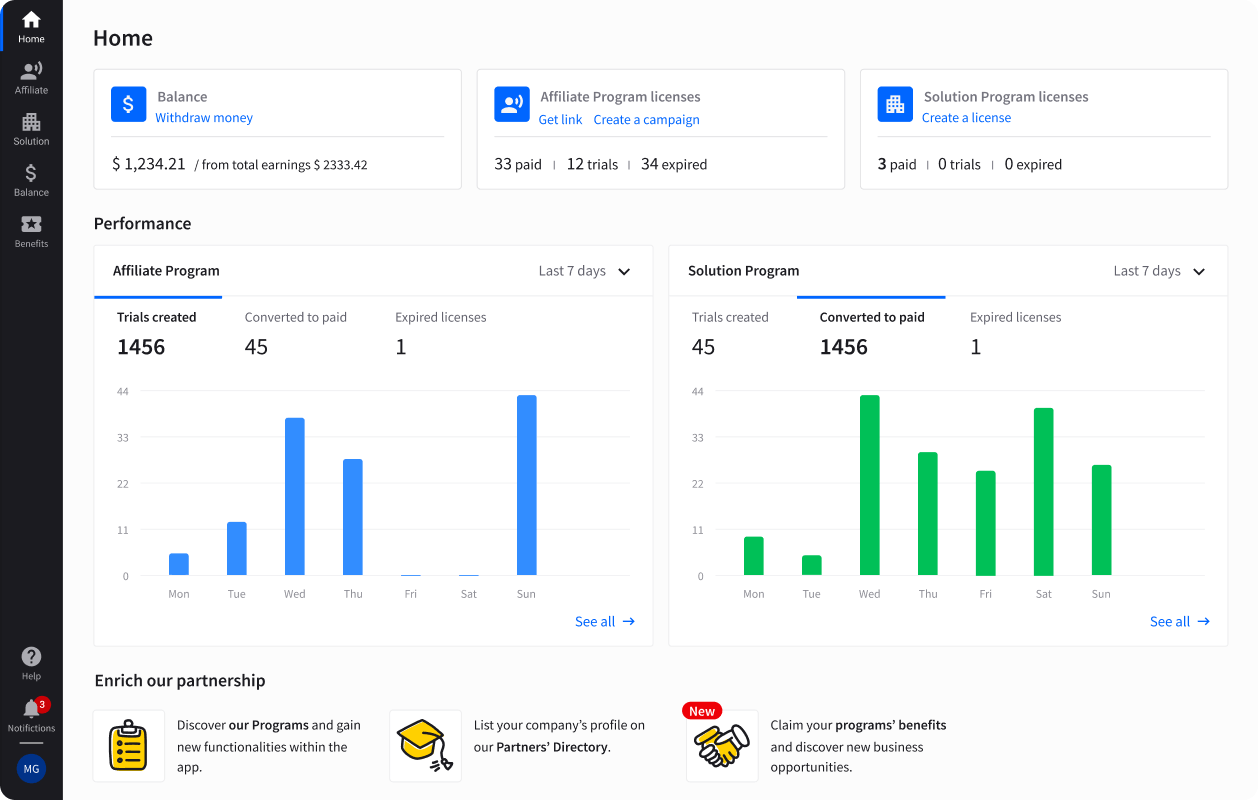
How partner programs support PPC campaign management
Partner programs are more than just an extension of your sales force — they can be a strategic multiplier for your PPC campaigns, especially when you're aiming to scale efficiently, enter new markets, or optimize for digital marketing performance. Here’s how:
Scalable campaign execution without internal overhead
One of the most immediate benefits of partner programs is the decentralization of campaign execution. Instead of relying solely on a central marketing team, partner programs enable their affiliates and resellers to run PPC campaigns independently using their own budgets and expertise.
- Affiliates promote programs through search ads, display networks, and social PPC.
- Resellers may run localized PPC campaigns to drive interest in bundled solutions.
This allows companies to scale their paid presence exponentially without increasing internal ad spend or team size.
Localized and niche market expertise
Partners often operate in specific geographies, industries, or communities. They understand the language, cultural nuances, customer pain points, and search behavior far better than a central team might.
- A reseller in Latin America might use Spanish-language PPC campaigns tailored to SMBs in retail.
- An affiliate focused on SaaS tools could target keywords like “live chat for SaaS onboarding.”
This level of hyper-targeting helps improve ad relevance, quality scores, and conversion rates.
Budget efficiency through distributed spend
Partner programs naturally reduce the financial burden on your core marketing team. While companies may run their own PPC campaigns, their partners, motivated by commissions or profit, invest their own budgets into promoting the product.
- Affiliates earn recurring revenue, so they’re incentivized to optimize campaigns for long-term retention.
- Resellers manage pricing and margins, giving them reason to fine-tune their cost-per-click and return on ad spend (ROAS).
This creates a network effect of advertising without central budget strain.
Performance-based risk mitigation
One of the affiliate model's standout features is that it’s entirely performance-based: partners only get paid when a user they refer becomes a paying customer. This means low upfront risk for the brand, high motivation for partners to create ads that convert, and a built-in optimization loop as partners monitor and tweak campaigns for profit.
As a result, companies benefit from constant experimentation and improvement, distributed across dozens (or hundreds) of partners.
Clear attribution through tracking infrastructure
Companies support their partners with tracking links, dashboards, and conversion reporting. This infrastructure ensures that:
- Every lead or sale can be accurately attributed to the right partner.
- Partners can measure their campaign performance (CPC, CTR, conversion rate).
- Companies can analyze top-performing traffic sources and use those insights to inform their own campaigns.
Proper attribution also avoids disputes and helps optimize commission-based incentives.
Brand governance and quality control
Companies provide guidelines and approved assets to ensure that all PPC campaigns remain on-brand and compliant. This includes:
- Rules about not bidding on the branded keywords list.
- Access to high-quality banners, copy templates, and landing page best practices.
- Support from a partner success team to ensure ethical, effective promotion.
This balance of freedom and structure ensures partners can be creative while upholding the company’s brand and conversion standards.
Feedback loops that fuel central strategy
Partners become an extension of the marketing R&D function. Because they run so many micro-campaigns, they provide insights on which headlines or ad formats perform best, which regions or industries respond most strongly, and what objections or pain points come up in messaging.
Companies can use this data to refine their core messaging and campaign strategy, making the overall PPC engine smarter over time.
Partner programs act as a force multiplier for PPC campaign management. By enabling a motivated, distributed network of advertisers — with localized expertise, shared investment, and performance incentives — companies effectively extend their digital reach, optimize spend, and scale acquisition without centralized bloat.
Best practices for integrating partner programs into PPC marketing strategy
To fully realize the value of partner programs in supporting your PPC management, it’s essential to build a framework that empowers partners while protecting your brand. Here are the key best practices to look for while looking for the best program to help you manage PPC campaigns:
| Best Practice | What to look for |
|---|---|
| Clear PPC policies and brand guidelines | Defined rules on keyword usage, bidding on branded terms, and compliance standards. |
| Quality creative assets | Access to pre-made ad banners, copy templates, and landing page designs. |
| Strong tracking and attribution | Unique affiliate links, UTM parameters, and real-time performance dashboards. |
| Performance insights and optimization | Shared data on high-performing keywords and ads, plus strategy support. |
| Competitive commission structure | Transparent, recurring, or high-percentage payouts with clear terms. |
| Partner support and communication | Access to partner managers, training resources, or responsive help channels. |
| Co-marketing or ad funding | Opportunities for co-op budgets or campaign reimbursements. |
| Flexibility and creative freedom | Ability to choose keywords, customize landing pages, and tailor targeting strategies. |
When evaluating a partner program to support PPC strategies, potential partners should look for certain foundational best practices that indicate the program is built for sustainable, scalable advertising success.
First, the program should have clear PPC policies and brand guidelines. These should define what’s allowed in terms of keyword bidding, especially around branded terms, and ensure that all messaging stays aligned with the brand’s standards. This reduces the risk of ad disapprovals or channel conflicts.
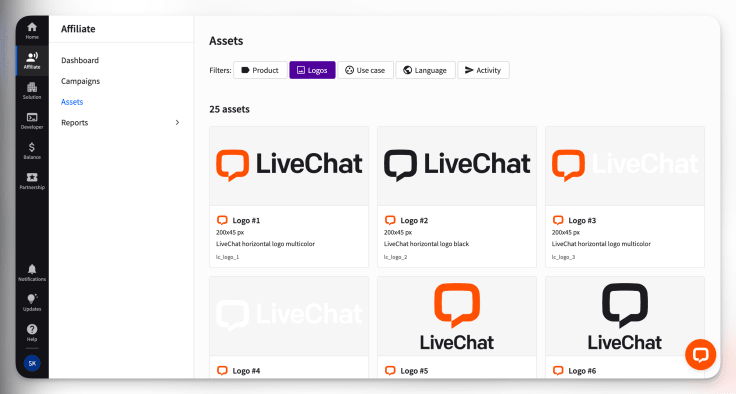
Equally important is access to high-quality creative assets, such as pre-designed banners, ad copy templates, and optimized landing page examples. These not only save partners' time but also ensure a professional, cohesive presentation across campaigns. Tracking infrastructure is another must-have; a good program will offer unique affiliate links, UTM tracking, and performance dashboards that give partners visibility into their campaign results and help attribute sales accurately.
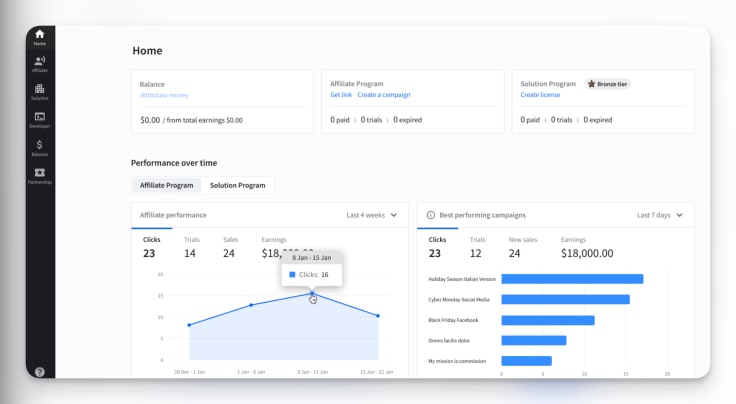
In addition, strong programs share performance insights — like top-converting keywords or campaign tips — and provide optimization support to help partners refine their strategies. A competitive, transparent commission structure ensures that partners are fairly rewarded, particularly when they're investing their own budget into PPC.
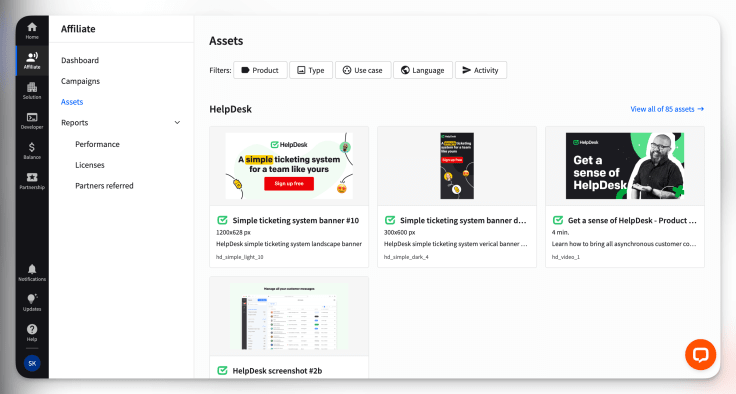
Ongoing communication and support — whether through a partner manager, community channel, or help center — allow partners to troubleshoot quickly and stay aligned with program updates. Some programs go even further by offering co-marketing or co-op funding opportunities, helping reduce risk and scale high-performing campaigns.
Finally, the best programs offer enough flexibility to let partners run creative, well-targeted campaigns — whether through custom landing pages, niche keyword targeting, or unique audience segmentation. When these best practices are in place, partners can confidently invest in PPC with the tools and trust they need to succeed.
Looking for a perfect partnership?
Join our Partner Program, test our customer service products and offer them to your customers and audience!

Text Partner Program in action (case example)
To see how a partner program can actively support and enhance PPC campaign management, let’s examine how one successful affiliate leveraged the Text Partner Program to generate consistent revenue through strategic paid advertising.
The Text Partner Program effectively supports two models:
As an affiliate, partners can earn up to 22% recurring commission for each referred customer who subscribes to Text. The program provides them with referral links, tracking tools, and marketing resources.
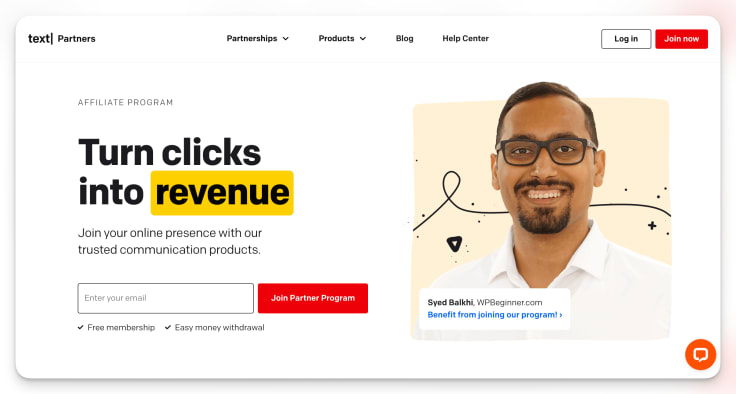
As a reseller, partners can white-label or bundle Text with their own services, offering it to clients with full control over pricing and onboarding.
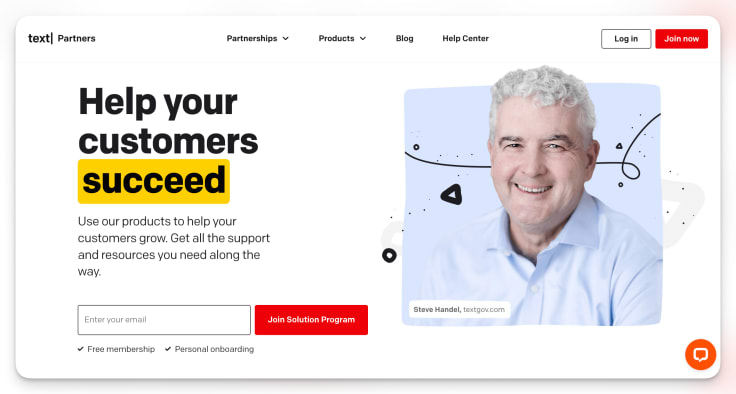
With Text's infrastructure, partners gain access to assets, dashboards, and support to help them optimize their promotional efforts, including those involving PPC advertising.
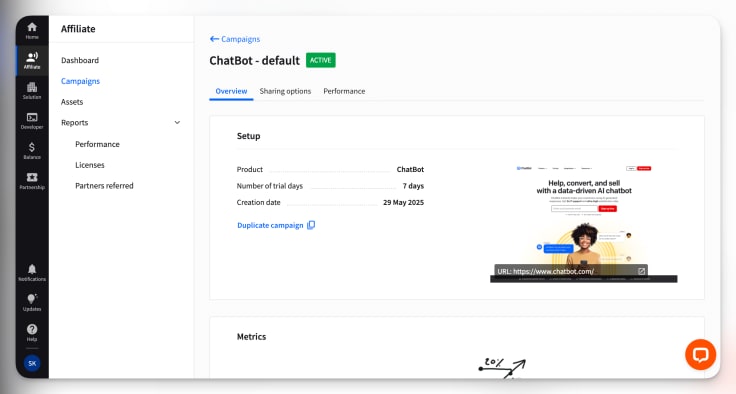
Case study: SaaS blogger turns PPC into a passive income engine
Background
John, a technology blogger and digital marketer based in the UK, joined the Text Affiliate Program in 2021. His niche blog, focused on customer support tools and SaaS productivity software, had some organic traffic, but he wanted to scale faster using Google Ads.
Strategy: Long-tail PPC campaigns targeting high-intent searches
John knew that bidding on generic terms like "live chat software" would be expensive and competitive. Instead, he used a long-tail keyword strategy, targeting very specific, high-intent searches such as: "Best live chat tool for Shopify stores", "Live chat software for startup SaaS teams", or "Text vs Intercom reviews".
He created dedicated landing pages on his blog for each ad group, offering honest comparisons, feature breakdowns, and call-to-actions using his Text affiliate links.
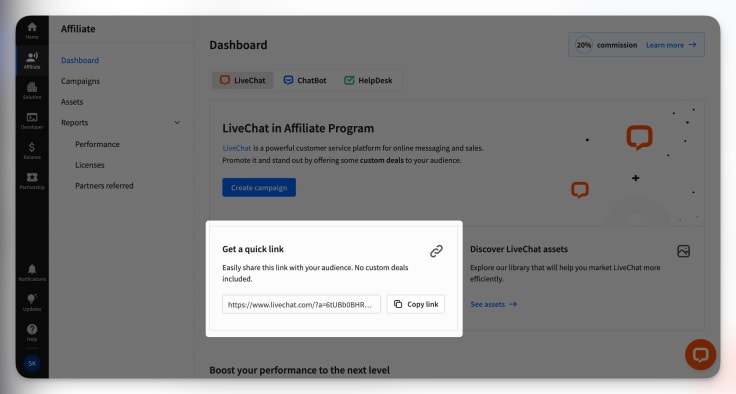
Execution and Optimization
| Metric | Value |
|---|---|
| Monthly ad spend (Google Search Ads) | $300-$500 |
| Click-through rate (CTR) | 5-7% average |
| Conversion rate (trial sign-ups) | ~4% of visitors |
| Recurring commissions | 20% monthly commission per paying customer |
John continuously A/B tested ad copy, monitored relevant keyword quality scores, and optimized landing pages for speed and relevance. Over 12 months, his campaigns matured into a predictable income stream.
Results (year 1)
| Metric | Value |
|---|---|
| Ad Spend (total) | ~$5,000 |
| Conversions (trial sign-ups) | ~300 |
| Customers retained (active subs) | 90+ |
| Annual recurring revenue (commissions) | ~$4,000+ and growing |
Not only did he recover his ad spend, but he also built a compounding revenue stream paid monthly, for customers retained by Text.
Why it worked
- Clear tracking: John used Text's affiliate dashboard and UTM parameters to monitor performance.
- Freedom to execute: He had full control over researching keywords and ad copy within brand guidelines.
- Support and resources: Text provided banners, copy ideas, and product documentation.
- Performance-based model: He only paid when clicks happened, but earned recurring commissions when users converted.
Lessons for other partners
- Niche targeting with PPC advertising works best when paired with value-rich landing pages.
- A performance-driven model like Text's motivates in-depth and effective PPC management.
- Even small-scale PPC campaigns can become profitable with the right tools, tracking, and partner support.
This example illustrates the power of combining partner programs with a PPC management company. When partners are equipped with resources, allowed to experiment, and incentivized through recurring income, they become highly effective PPC marketing contributors and a major asset to the brand's overall acquisition strategy.
Conclusion
As PPC advertising becomes more competitive and complex, growth-stage companies need smarter, more scalable ways to manage their campaigns. Partner programs offer a powerful solution, enabling businesses to expand their digital reach, tap into new markets, and reduce the burden on internal teams.
The Text Partner Program is a prime example of how well-structured partnerships can supercharge PPC efforts. By equipping affiliates and resellers with the right tools, resources, and incentives, Text has built a decentralized network of high-performing campaigns that drive measurable growth, all while maintaining brand control and cost efficiency.
Whether you're just beginning to explore partnerships or looking to better align your existing program with your paid advertising strategy, the key lies in structure, support, and shared success. When partners are empowered to run PPC campaigns with clarity and confidence, everyone wins: the brand, the partner, and the end customer.
Now is the time to rethink PPC — not as a centralized function, but as a collaborative growth engine fueled by your most committed advocates.


